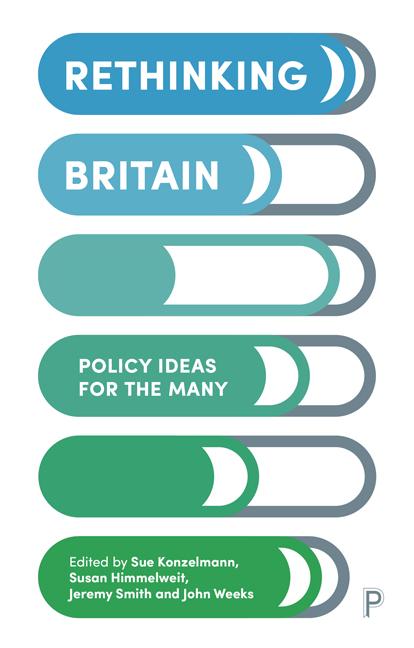Book contents
- Frontmatter
- Contents
- List of Tables and Figures
- The Contributors
- Foreword
- Introduction
- Interlude: ‘Mirror, Mirror, On the Wall – Who has the Highest Debt of All?’
- Part One Building a Full-Employment Economy: Introduction
- Part Two Public Investment – Prioritising Society Rather than Profit: Introduction
- Part Three Making Finance Work for Society: Introduction
- Part Four Genuine Social Security: Introduction
- Part Five How to provide for Social Needs: Introduction
- Conclusion
- Jargon Busters
- References and Further Reading
- Index
Introduction
Published online by Cambridge University Press: 11 March 2021
- Frontmatter
- Contents
- List of Tables and Figures
- The Contributors
- Foreword
- Introduction
- Interlude: ‘Mirror, Mirror, On the Wall – Who has the Highest Debt of All?’
- Part One Building a Full-Employment Economy: Introduction
- Part Two Public Investment – Prioritising Society Rather than Profit: Introduction
- Part Three Making Finance Work for Society: Introduction
- Part Four Genuine Social Security: Introduction
- Part Five How to provide for Social Needs: Introduction
- Conclusion
- Jargon Busters
- References and Further Reading
- Index
Summary
The genesis of this book is to be found in the outcome of the 2017 General Election, called by Prime Minister Theresa May with the aim of increasing her government's comfortable parliamentary majority. To the surprise of most pundits and pollsters, the final result was a government with no overall majority – and this despite, or more probably because of, the largest opposition party running on a relatively radical manifesto, and garnering 40 per cent of the popular vote.
For present purposes, we may draw two broad lessons from this outcome. First, that a large proportion of the British population no longer (if they ever did) support or accept the economic justification for austerity, nor see it as the overarching ‘organising principle’ for public policy. On the contrary, it was clear to them that ‘austerity’ was a political choice. The British Social Attitudes report for 2017, for example, found that
After seven years of government austerity programmes by the Conservative-Liberal Democrat coalition and then Conservative majority government, the public is turning against spending less.
For the first time since the financial crash of 2007-8, more people (48%) want taxation increased to allow greater spending, than want tax and spend levels to stay as they are (44%). More people (42%) agree than disagree (28%) that government should redistribute income from the better off to those who are less well-off. Shortly before the financial crisis fewer people supported redistribution than opposed it (34% and 38% respectively in 2006). (Clery et al, 2017: 3)
This turn against the continuing policy primacy of austerity appears to have gathered strength in the post-election period. By austerity, we refer to policies that aim or claim to reduce a fiscal deficit predominantly by public spending cuts, with tax rises playing a lesser role. Indeed, in the UK a raft of tax cuts (rather than rises) accompanied spending reductions, thereby worsening inequality. The Financial Times commissioned the nicely named Number Cruncher Politics to undertake research, and reported on 2 May 2018:
…[P]olling we have conducted at Number Cruncher Politics reveals that an overwhelming majority of voters now feels that cuts to public services have gone too far.
- Type
- Chapter
- Information
- Rethinking BritainPolicy Ideas for the Many, pp. 1 - 6Publisher: Bristol University PressPrint publication year: 2019



